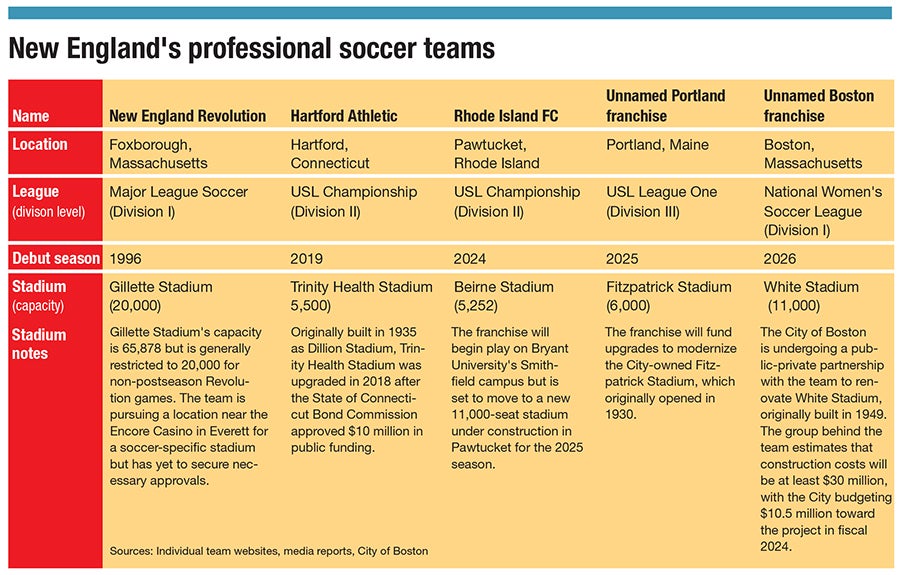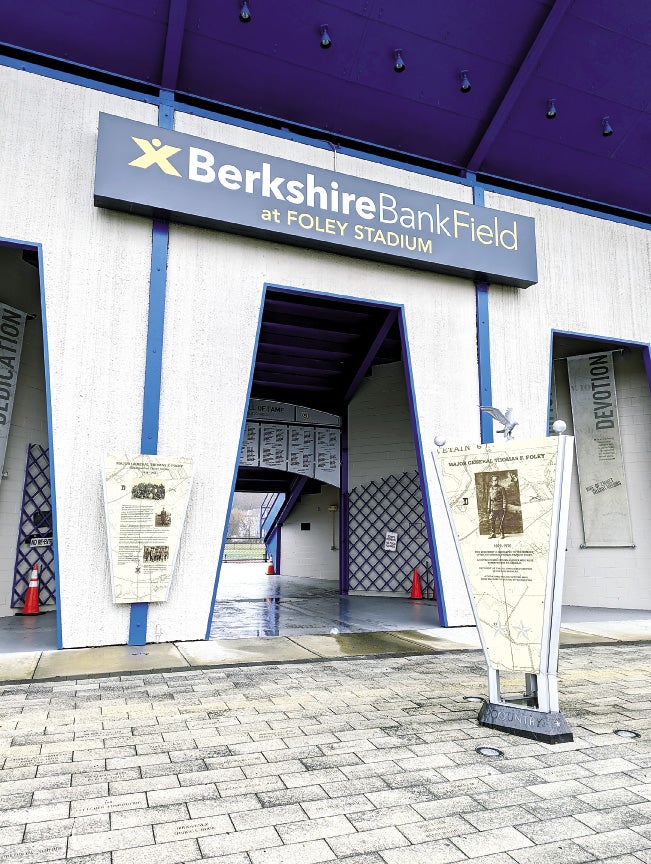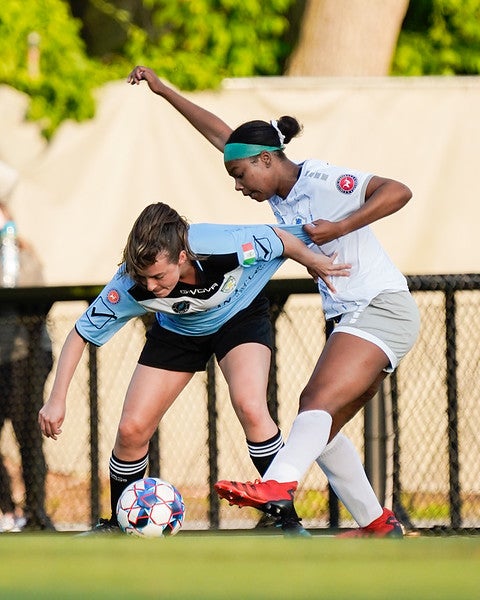Since 2018, professional men’s or women’s soccer teams have been announced or launched in Boston, Hartford, Pawtucket, and Portland, while New England’s second-largest city has been sitting on the proverbial sidelines.
Get Instant Access to This Article
Subscribe to Worcester Business Journal and get immediate access to all of our subscriber-only content and much more.
- Critical Central Massachusetts business news updated daily.
- Immediate access to all subscriber-only content on our website.
- Bi-weekly print or digital editions of our award-winning publication.
- Special bonus issues like the WBJ Book of Lists.
- Exclusive ticket prize draws for our in-person events.
Click here to purchase a paywall bypass link for this article.
If soccer fever is about to sweep the U.S. in the lead up to the country hosting the 2026 FIFA Men's World Cup, it seems Central Massachusetts residents will still need to travel outside the region to catch a professional-level game.
Since 2018, professional men’s or women’s soccer teams have been announced or launched in Boston, Hartford, Pawtucket, and Portland, while New England’s second-largest city has been sitting on the proverbial sidelines.
Despite the area’s robust sports scene and growing population, Central Massachusetts has yet to see any tangible movement toward a professional soccer club, leading fans of the beautiful game to wonder what’s missing.
A growing game
Soccer has reached the point where all but the most casual sports fans are aware of Major League Soccer, the top men’s league featuring New England Revolution, based in Foxborough.
Perhaps fewer are aware of the United Soccer League, a professional soccer organization based in Florida operating USL Championship, USL League One, and USL League Two, three leagues that respectively serve as the second, third, and fourth divisions of men’s soccer.
The organization doesn’t share any affiliation with MLS or its franchises. Unlike the minor leagues of the NHL or MLB, the USL is not a farm system for the top division.
The Championship, alongside League One, both feature salary-drawing players, while League Two focuses on being a home for developmental teams for college-age athletes, similar to the business model of baseball’s Worcester Bravehearts.
The league structure of the female game is a bit more muddled. The National Women's Soccer League is considered by U.S. Soccer Federation to be the top-division league. Headquartered in New York City, the league announced in September the launch of a Boston-based franchise in 2026.
Another women’s league, the USL Super League, aims to share top-division league status with the NWSL when it launches in 2024.

Youth programs key
If anyone is interested in starting a professional team in Worcester, they’ve kept a low profile. Tom Matthews, media and public relations administrator for the City of Worcester, confirmed to WBJ via email officials haven’t received any outreach from anyone interested in bringing pro soccer to Worcester.
But the lack of formal outreach doesn’t mean figures in the local soccer scene aren’t thinking about it.
Jason Braga, vice president of New England Futbol Club, a Mendon-based not-for-profit training players from ages 6 to 23, said his organization has considered creating a League Two team.
“We’ve definitely entertained it.” Braga said. “We do see the value of providing those role models at the local level.”
While the enthusiasm is there, two major barriers remain: the cost of launching a team and the lack of an obvious venue. The costs of launching run in the tens of thousands of dollars, even at a lower level like League Two.
Having a robust youth soccer program like NEFC nearby is a key to success for lower-level teams, said longtime soccer journalist Josh Hakala.

Hakala is founder of TheCup.us, a website covering the Lamar Hunt U.S. Open Cup. This yearly nationwide tournament was first played in 1914 and features teams from levels ranging from MLS to amateurs, offering obscure teams a chance at a bigger spotlight and meaningful prize money.
Hakala has seen many franchises come and go in his decades covering the sport. Being near a successful youth soccer system is key to survival, he said.
“Most of the successful teams have based themselves around a strong youth soccer community,” he said. “Any team that is trying to build from the ground up is trying to cultivate a fanbase, and what better way to do that than to have a youth academy that you can work with?”
Stadium control a plus
One example of a team finding success is League Two’s Western Mass Pioneers, who have played at Lusitano Stadium in Ludlow since 1998. The club has made the playoffs for three consecutive years and qualified for the upcoming U.S. Open Cup.
Built in 1918, the club’s 3,000-seat stadium, combined with support from the local Portuguese community, has helped the squad be one of the longest-running franchises in the league.
Having complete control of the stadium’s concessions and advertising has been a key to the Pioneers’ success, allowing the team to maximize revenue produced by League Two’s short schedule, said Brandon Smith, director of communications and board member of the club. The intimate stadium offers 12 beers on tap and a variety of food options. Tickets are $10.
“A lot of people appreciate the vibe of the stadium,” Smith said, “It’s in the middle of a neighborhood. You come in, and you can feel the history of it.”
Existing adult soccer teams in Worcester have to make do with renting playing venues.
UNations FC, a men’s team formed in 2004 and playing in various amateur leagues, and Worcester Fuel FC, a women’s team founded as Worcester Smiles FC in 2018 playing in the developmental United Women’s Soccer League Two, both play at Commerce Bank Field at Foley Stadium in Worcester.

Fuel FC’s fanbase is limited by the lack of financial resources when compared to teams like the Worcester Red Sox and Worcester Railers, said Raymund Lopolito, owner of Fuel FC.
“A lot of [prospective fans] don’t know about us because we’re grassroots, and we don’t have the same level of funding,” Lopolito said, expressing a desire to have the city’s political realm and media do more to support the team.
Foley Stadium is arguably the most prominent soccer venue in Central Massachusetts. The stadium hosted multiple exhibition games featuring the U.S. Women’s National Team in the 1990s, Lopolioto said, and Foley was briefly home of the Worcester Wildfire and the Worcester Hydra, two minor league men’s teams.
This period saw large amounts of growth in the game in the wake of the United States hosting the 1994 Men’s World Cup, a tournament including six games at Foxboro Stadium, which would become the home of the New England Revolution in newly created Major League Soccer the following year. MLS has since expanded from 10 to 29 teams.
With the 2023 arrival of world famous soccer star Lionel Messi to MLS’ Inter Miami CF and the upcoming World Cup, there’s expectation that the next few years will once again see a wave of soccer enthusiasm sweep the country.
The Revolution are now heading into their 29th year of existence, but lower league teams that have tried to make Central Massachusetts home haven’t had the same luck.
The Wildfire began play in 1996 but moved to Framingham’s Bowditch Field and changed their name to the Boston Bulldogs in 1999 before folding in 2001. The team averaged 1,539 fans at Foley Stadium in 1997, according to The A-League Archives, a website chronicling the history of second-division soccer.
Later on, the Hydra lasted a single season in 2012 before they folded, citing financial issues.
Worcester County’s population has grown a lot since the first time the country hosted the World Cup, adding 119,501 residents from 1990 to 2020, according to the U.S. Census Bureau.
Foley’s current usefulness is limited by its size, neighbor's noise complaints, a lack of parking, and the venue’s status as a high school sports venue, which prevents alcohol sales, said Lopolito.

Polar Park pitch
Elsewhere in Worcester, College of the Holy Cross’ Fitton Field holds 23,500, but satellite imaging shows its surface is approximately 210 feet wide, too small to properly accommodate a soccer pitch without the stadium’s walls impairing play.
This leaves the Polar Park baseball stadium as one of the few potential venues with the right capacity and amenities for a pro team. The stadium’s football configuration used for the annual EBW Football Classic suggests a soccer pitch could fit, even if it would be tight.
A baseball field often may offer soccer fans less-than ideal sightlines, but it’s not uncommon for USL-level teams to play in Minor League Baseball parks.
Three USL teams – FC Tulsa, Memphis 901 FC, and Albuquerque’s New Mexico United – play at venues that are the home of franchises owned by Diamond Baseball Holdings, the New York firm that purchased a majority share of the Worcester Red Sox in December.
Lopolito said his limited discussions with the WooSox, who oversee the use of the City-owned Polar Park, about hosting soccer haven’t led to results. But team officials remain optimistic.
“We have been approached previously about soccer possibilities at Polar Park, and we’d like to find a way to make it happen in the future,” Bill Wanless, WooSox senior vice president of communications, said via email.
In the day and age where lower-level teams are building soccer-specific stadiums, ballparks aren’t an ideal permanent home, said Hakala, the soccer journalist.
“I can’t think of a baseball stadium that has worked on a long-term basis,” he said.
Regardless of the venue, a prospective Worcester soccer franchise will need to find a team of employees who understand the challenging road ahead and are passionate about marketing the sport, said Hakala.
“Anyone who's worked in minor league sports will tell you need to find people who can wear a lot of different hats,” he said. “It’s a passion project for a lot of people, but you have to have good people at the core of it to make it work.”
